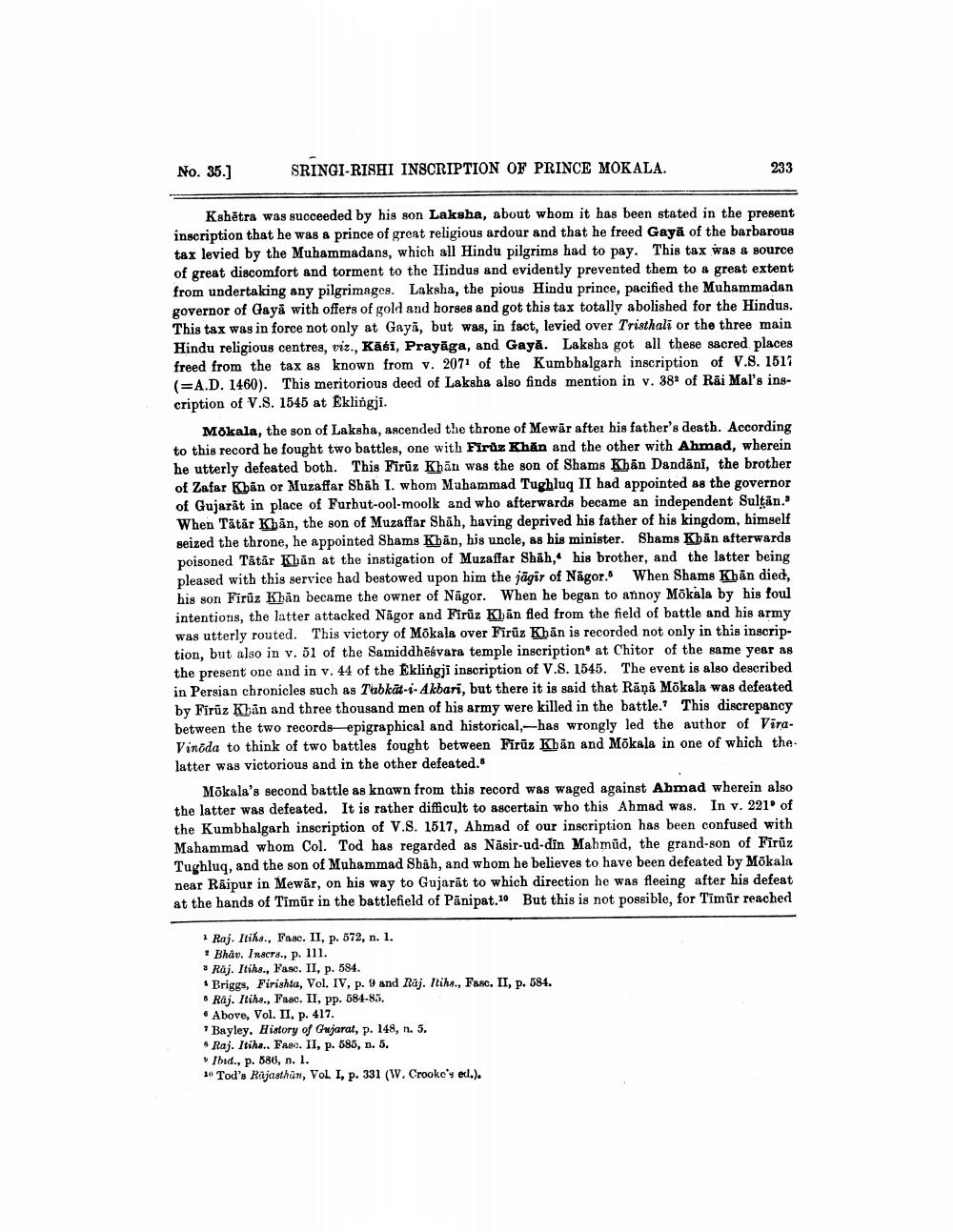________________
No. 35.]
SRINGI-RISHI INSCRIPTION OF PRINCE MOKALA.
Kshetra was succeeded by his son Laksha, about whom it has been stated in the present inscription that he was a prince of great religious ardour and that he freed Gaya of the barbarous tax levied by the Muhammadans, which all Hindu pilgrims had to pay. This tax was a source of great discomfort and torment to the Hindus and evidently prevented them to a great extent from undertaking any pilgrimages. Laksha, the pious Hindu prince, pacified the Muhammadan governor of Gaya with offers of gold and horses and got this tax totally abolished for the Hindus. This tax was in force not only at Gaya, but was, in fact, levied over Tristhali or the three main Hindu religious centres, viz., Käsi, Prayaga, and Gaya. Laksha got all these sacred places freed from the tax as known from v. 2071 of the Kumbhalgarh inscription of V.S. 1517 (A.D. 1460). This meritorious deed of Laksha also finds mention in v. 383 of Rai Mal's inscription of V.S. 1545 at Eklingji.
Mokala, the son of Laksha, ascended the throne of Mewar after his father's death. According to this record he fought two battles, one with Firüz Khan and the other with Ahmad, wherein he utterly defeated both. This Firüz Khan was the son of Shams Khan Dandani, the brother of Zafar Khan or Muzaffar Shah I. whom Muhammad Tughluq II had appointed as the governor of Gujarat in place of Furhut-ool-moolk and who afterwards became an independent Sultan." When Tätär Khan, the son of Muzaffar Shah, having deprived his father of his kingdom, himself seized the throne, he appointed Shams Khan, his uncle, as his minister. Shams Khan afterwards poisoned Tätär Khan at the instigation of Muzaffar Shah, his brother, and the latter being pleased with this service had bestowed upon him the jägir of Nagor. When Shams Khan died, his son Firüz Khan became the owner of Nagor. When he began to annoy Mōkala by his foul intentions, the latter attacked Nagor and Firüz Khan fled from the field of battle and his army was utterly routed. This victory of Mokala over Firüz Khan is recorded not only in this inscription, but also in v. 51 of the Samiddhësvara temple inscription at Chitor of the same year as the present one and in v. 44 of the Eklingji inscription of V.S. 1545. The event is also described in Persian chronicles such as Tabkat-i-Akbari, but there it is said that Rāņā Mōkala was defeated by Firüz Khan and three thousand men of his army were killed in the battle." This discrepancy between the two records-epigraphical and historical,-has wrongly led the author of ViraVinoda to think of two battles fought between Firüz Khan and Mōkala in one of which the latter was victorious and in the other defeated."
233
Mōkala's second battle as known from this record was waged against Ahmad wherein also the latter was defeated. It is rather difficult to ascertain who this Ahmad was. In v. 221' of the Kumbhalgarh inscription of V.S. 1517, Ahmad of our inscription has been confused with Mahammad whom Col. Tod has regarded as Nasir-ud-din Mahmud, the grand-son of Firüz Tughluq, and the son of Muhammad Shah, and whom he believes to have been defeated by Mōkala near Raipur in Mewar, on his way to Gujarat to which direction he was fleeing after his defeat at the hands of Timur in the battlefield of Panipat.10 But this is not possible, for Timur reached
1 Raj. Itihs., Fasc. II, p. 572, n. 1.
Bhav. Insers., p. 111.
3 Raj. Itihs., Fasc. II, p. 584.
Briggs, Firishta, Vol. IV, p. 9 and Raj. Itihs., Fasc. II, p. 584.
5 Raj. Itihe., Fasc. II, pp. 584-85.
Above, Vol. II, p. 417.
Bayley. History of Gujarat, p. 148, n. 5.
5 Raj. Itiha.. Fasc. II, p. 585, n. 5.
Ibid., p. 586, n. 1.
10 Tod's Rajasthan, Vol. I, p. 331 (W. Crooke's ed.).




